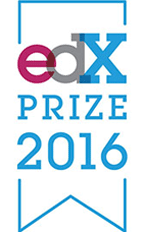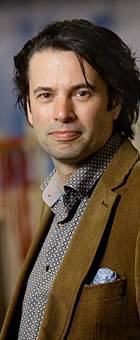Winner of the edX Prize 2016
 TU Delft Professor Arno Smets wins the inaugural edX Prize for his exceptional contributions in online teaching and learning. His MOOCs Solar Energy and Sustainable Energy: Design a Renewable Future have reached more than 150,000 learners worldwide and have paved the way to a more sustainable world.
TU Delft Professor Arno Smets wins the inaugural edX Prize for his exceptional contributions in online teaching and learning. His MOOCs Solar Energy and Sustainable Energy: Design a Renewable Future have reached more than 150,000 learners worldwide and have paved the way to a more sustainable world.
 In the last 3 years, Dr. Arno Smets undertook a leading role in creating two Massive Open Online Courses (MOOCs) aimed at increasing the level of knowledge of learners around the world of sustainable energy technologies. His efforts have been graciously recognized by EdX, who has awarded him with the EdX Prize for exceptional contributions in online teaching and learning.
In the last 3 years, Dr. Arno Smets undertook a leading role in creating two Massive Open Online Courses (MOOCs) aimed at increasing the level of knowledge of learners around the world of sustainable energy technologies. His efforts have been graciously recognized by EdX, who has awarded him with the EdX Prize for exceptional contributions in online teaching and learning.
“We are honored to present TU Delft Professor Arno Smets with the first-ever edX Prize,” said Anant Agarwal, edX CEO and MIT Professor. “The prize recognizes a teacher who has demonstrated a commitment to the open and online education community and who has taught high quality courses that continue to inspire and encourage edX learners everywhere.”
The edX Prize winner was announced on November 16 at the 2016 EdX Global Forum in Paris. The 11 finalists for the edX Prize included (professors from) universities like Harvard, UC Berkeley and Adelaide.
Anka Mulder, TU Delft vice-president for education & operations, said that the Solar Energy MOOC, which has also been translated into Arabic and Chinese, has further consolidated the position of the Electrical Sustainable Energy department internationally as a leading education and research group in the field of solar energy.
“Through the Solar Energy course, Professor Smets has established a network of worldwide learners and enabled them to collaborate, creating solutions that have had a direct societal impact in their local communities. By using innovative online teaching tools, like custom animation, promoting peer interaction and facilitating discussions, Professor Smets guides learners through the process of creating a photovoltaic system. The systems simulate the use of renewable energy, and show how it can have an immediate impact in improving the lives of those living in developing countries and how it can make an overall contribution to a more sustainable world.” - edX News
The Solar Energy MOOC: a True Learning Experience
Through the Solar Energy MOOC, TU Delft gives students from all over the world the opportunity to gain knowledge relating to solar energy systems and apply that knowledge in practice. One of the subjects covered by the MOOC is Photovoltaics (PV), a technology with which sunlight can be converted into electricity using semiconducting materials.
The MOOC has enabled an international community of online learners to interact and share their experiences, which has also empowered them to improve not only their lives but also the development of their communities.
Andersson Contreras, an Electronic Engineer from Colombia who enrolled in the first run of the Solar Energy MOOC said the course changed many aspects of his life: “Not only academic, but also economic and environmental aspects.”
“Using all this knowledge, I installed my own PV system using the mathematical tools provided for that purpose and the economic results of the system are very satisfactory. I have a saving of over 50% on the cost of my energy, I have a continuous electricity supply and I am contributing to the reduction of greenhouse gases to the atmosphere.”
Professor Arno Smets
Dr. Arno H.M. Smets is Professor in Solar Energy in the Photovoltaics Material and Devices group at the faculty of Electrical Engineering, Mathematics and Computer Science, Delft University of Technology. From 2005-2010 he worked at the Research Center for Photovoltaics at the National Institute of Advanced Industrial Science and Technology (AIST) in Tsukuba Japan. His research work is focused on processing of thin silicon films, innovative materials and new concepts for photovoltaic applications. He is co-author of the book “Solar Energy. The physics and engineering of photovoltaic conversion technologies and systems.”
See also: